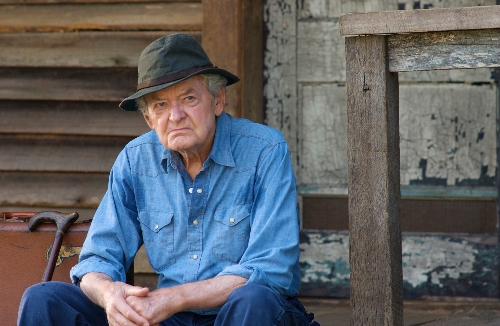‘That Evening Sun’
Times change -- but some people have no intention of changing with them.
That certainly applies to Abner Meecham, the flinty protagonist of "That Evening Sun," a down-home drama that provides yet another reminder (as if we needed one) of Hal Holbrook's ability to inhabit characters who don't say a whole lot -- but have a lot to say about the human condition.
Happily, the movie's far more than just a Holbrook showcase.
It's the kind of low-budget indie where nothing much happens -- except when it comes to the never-ending struggle to get through the day.
For Abner, that struggle's never been tougher.
A self-described "80-year-old man with a bum hip and a weak heart," the widowed Abner has spent his life on the family farm in eastern Tennessee.
Now, however, he finds himself put out to pasture -- in a retirement home where he feels anything but at home.
So Abner literally walks away from the retirement home and heads back to the farm, only to discover that his lawyer son ("The Shield's" Walton Goggins) has betrayed him yet again -- by leasing the farm to Lonzo Choat ("Deadwood's" Ray McKinnon), a no-account layabout Abner's always despised.
With Lonzo, Lonzo's world-weary wife Ludie ("True Blood's" Carrie Preston) and antsy teenage daughter Pamela ("In Treatment's" Mia Wasikowska, soon to be seen in "Alice in Wonderland") making themselves at home, Abner retreats to the farm's sharecropper shack and plots his next moves.
Some of them seem relatively harmless -- as when Abner gets himself an especially yappy dog, knowing all too well that every time the dog barks, it's guaranteed to make Lonzo bark even more.
But some of Abner's ploys seem expressly designed to spark a violent confrontation, almost as if the old man's determined to rage, rage against the dying of the light -- by raging against a man he considers utterly unworthy of taking his place.
Based on a short story by William Gay, "That Evening Sun" marks a carefully crafted, quietly insightful feature debut by writer-director Scott Teems.
In less sensitive hands, Abner and Lonzo's escalating war of words -- and deeds -- might slip into over-the-top melodrama, with Abner the embattled good guy and Lonzo the walking redneck cliche.
But Teems seems determined to explore every character's conflicts, giving "That Evening Sun" a richness and depth most movies lack.
No one's all good (except maybe Preston's amazingly patient wife) and no one's all bad. Not even loser Lonzo, desperately trying to find a way to make things work despite the fact that he's never made anything work before.
Even Abner's son has his reasons for doing what he's doing -- reasons that have everything to do with his father's gruff, unyielding approach to people. Even people he loves.
Then again, this younger generation just doesn't understand things -- as Abner ruminates to his neighbor Thurl Chessor (a grizzled, pitch-perfect Barry Corbin).
Thurl's content to sit and whittle the days away, watching life pass him by from his front-porch perch.
Abner, of course, has no such luxury. And even if he did, he doesn't have the temperament -- or the stomach -- for it.
Holbrook conveys Abner's love-hate relationship with life (and himself) in splendidly subtle fashion.
Expanding on his quietly moving, Oscar-nominated "Into the Wild" performance, Holbrook (who's in almost every scene) resists the temptation to turn Abner into a lovably grizzled old coot. There's not an ounce of self-indulgent sentimentality in his performance; he's as spare and hard-scrabble as the life Abner's lived.
Which, inevitably, makes his reminiscences all the more poignant when Abner reflects on all that's past -- and what little future looms before him.
It's the kind of performance that should have earned an Oscar nomination.
Just because it didn't, however, doesn't mean it's not worthy of celebration.
Like its protagonist, "That Evening Sun" says things are worth doing -- and life is worth living -- because there's not much alternative.
When choosing a movie, there's always an alternative.
Unless, of course, you're looking for a smart, heartfelt character study that's content to be exactly what it is. In which case there's not much alternative to "That Evening Sun" at all.
Contact movie critic Carol Cling at ccling@reviewjournal.com or 702-383-0272.
Review
"That Evening Sun"
110 minutes
PG-13; brief profanity, violence, sexual content, thematic elements
Grade: B+
at Village Square
Deja View
A variety of characters, in a variety of settings, confront old age in these memorable movies:
"Make Way for Tomorrow" (1937) -- Newly available on DVD, director Leo McCarey's Depression-era classic focuses on an elderly couple (Victor Moore, Beulah Bondi) who lose their home and must split up when their kids can't afford to take them in.
"The Trip to Bountiful" (1985) -- Geraldine Page won an at-long-last Academy Award for her portrayal of a widow, trapped in 1940s Houston, who breaks away to make a sentimental journey to the small Texas town she once called home.
"The Straight Story" (1999) -- A septuagenarian (Richard Farnsworth) bids farewell to his devoted daughter (Sissy Spacek) to hit the road, on his riding lawn mower, to reconcile with his ill brother in director David Lynch's lyrical fact-based drama.
"Away From Her" (2006) -- In this devastating drama, a loving husband (Gordon Pinsent) struggles to deal with the fact that his Alzheimer's-afflicted wife (Julie Christie) no longer remembers him -- and has transferred her affections to a fellow nursing home patient.
"Is Anybody There?" (2008) -- In a small British town, a curmudgeonly magician (Michael Caine) finds an unlikely friend in a precocious 10-year-old (Bill Milner) whose parents have transformed the family residence into an old-folks home.
-- By CAROL CLING















